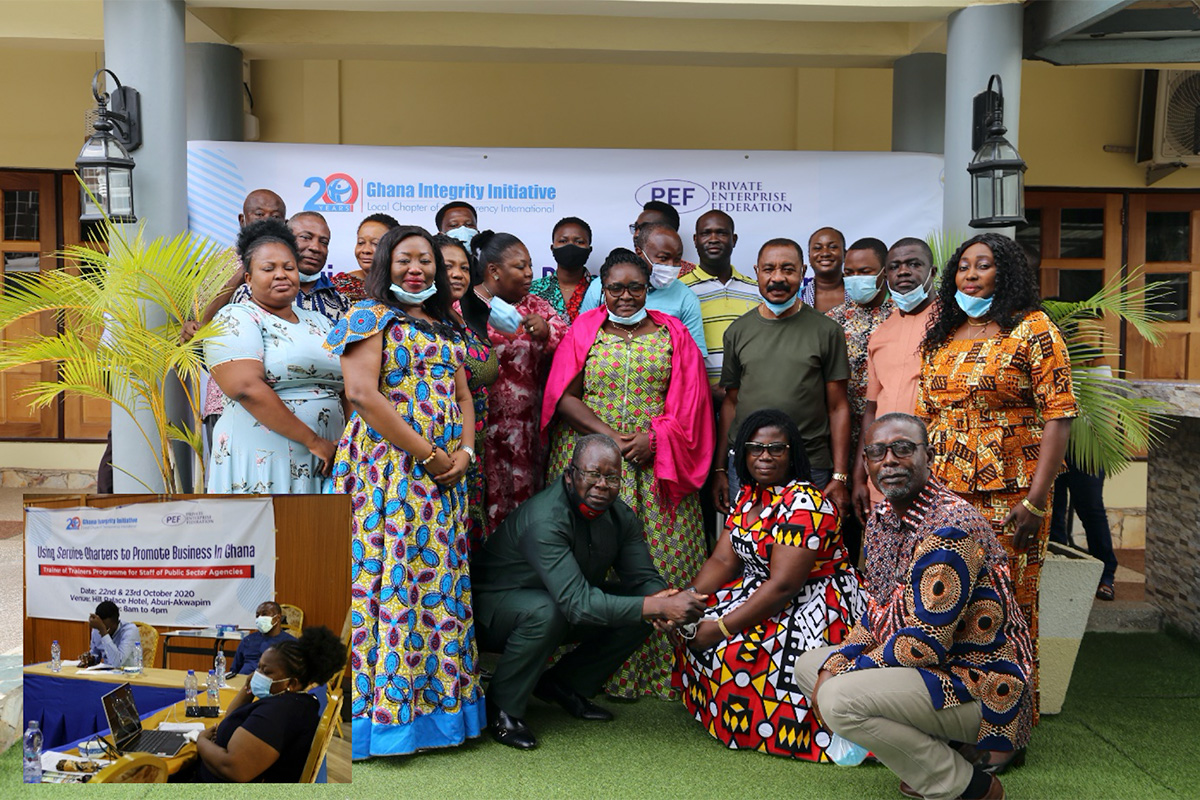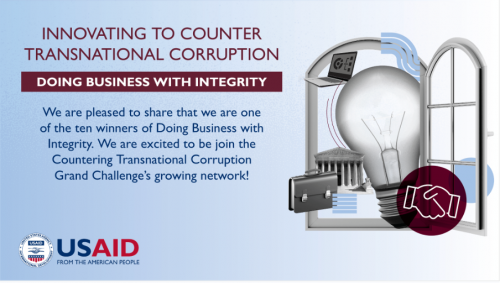How service delivery charters in Ghana are creating dialogue between citizens, businesses and government

This case study and Q&A looks at a recent UK Business Integrity Initiative-funded project in Ghana to create and implement 10 service delivery charters for government licensing and approval authorities through a Collective Action approach. The project was carried out by the Ghana Integrity Initiative, which is the local chapter of Transparency International, in collaboration with the Private Enterprise Federation.
What is the idea behind service delivery charters?
Service delivery charters (SDCs) are tools meant to close the critical knowledge gap between service providers and service users. The paradigm example is this:
A citizen or businessperson goes into the local vehicle authority office and requests a replacement driving licence, a process that should cost 100 cedis and take one week. “It will take 4 weeks and cost 200 cedis,” says the official, “but I can arrange it more quickly if you pay me an express fee.”
How can someone in that situation demand compliance if they do not know what they should expect from a government service provider and what they can demand? Time and again, our assessments have shown that this kind of systemic knowledge imbalance opens up opportunities for corruption.
The basic idea behind service charters is to close that knowledge gap. But to us, more important than the document is the conversations that take place between the different stakeholders. We didn’t start this project with the aim of creating 10 pieces of paper, but of getting more businesses to engage openly and productively with public institutions on integrity issues.
Who benefits and how?
In theory, service delivery charters are a win-win-win tool. Citizens and businesses receive enhanced standards of service, including faster turnaround times and standard and predictable pricing. They are less likely to be asked to pay extra “fees” for regular services, increasing trust in institutions.
Another benefit from the government’s perspective is that if services are provided properly and on time, then productivity increases.
Tell us about SDCs in practice
Ghana’s Commission on Human Rights and Administrative Justice (CHRAJ) had already developed a template service delivery charter, or “client service charter” as it was known, in collaboration with the Public Sector Reform Secretariat. But there were challenges in implementing the idea effectively.
One barrier to implementation that we noted is a lack of capacity in government authorities. Our approach therefore includes support for building this capacity through a sustainable “train the trainer” model plus a written manual.
Another barrier is getting buy-in from all sides: high-level politicians, the officials in charge of providing the services, and the citizens and businesses that use them. This is why we need a Collective Action approach that encourages dialogue and fosters mutual understanding.
Our goal was not just to create and roll out the charters, but to get more businesses to engage with public institutions on integrity issues.
Why the focus on business-government dialogue?
As a local chapter of Transparency International, the Ghana Integrity Initiative is a civil society organisation that works towards reducing corruption in our country. We see that the biggest users of government services – and therefore those most often exposed to corruption – are businesses that interact with authorities to obtain licences, permits, vehicle registrations, etc.
To better understand the needs and experiences of businesses in Ghana, and to get them actively involved in this Collective Action, we partnered with the Private Enterprise Federation (PEF). The PEF is a non-profit, non-political, independent apex business association. It represents the majority of various umbrella Ghanaian business associations and chambers that are constituted by individual businesses.
Can you take us through the process of developing an SDC?
We took the CHRAJ’s template charter as a base and worked collaboratively to enhance it, drawing in expertise to make sure it better reflects Ghana’s legislative frameworks for service delivery and related institutional arrangements. We also studied best practices in comparison to what was really happening on the ground.
The next stage involved a gap analysis, in which we visited the authorities, assessed the various services they offered and established the “value chain” of each service from start to finish. We invariably found gaps, which we discussed in detail at a meeting with the heads of each authority. How can we close these gaps? And how can we then codify them back into the service charter?
We found both the private-sector representatives and the government counterparts to be proactive and interested throughout the process. Some officials added extra provisions to the charter and made suggestions to improve it. They also told their counterparts in other government departments about our joint work, and we started to receive further requests for support outside the original scope of the project. A good sign, I think, that the project provided value.
The moment of truth was bringing the private and public sector representatives together in a meeting to validate the final document and tie up any loose ends. Facilitating such a meeting requires great sensitivity and an understanding of how to build trust between the groups.
Roll-out and communication what is the plan?
At the very least, the service delivery charters will be put up at the point of service delivery. The Federation will also inform those members who have not been involved in the project until now.
On the government side, the Minister for Public Service Reform was due to launch the charters earlier this year. This was disrupted due to the pandemic. High-level endorsement of anti-corruption tools is important, so we hope this will still go ahead shortly despite the disruption caused by the elections this month.
With additional funding support, we would be able to roll them out through the media, such as radio talk shows where service providers and users discuss the charters and what value they bring. Short messages and information campaigns on social media also have a lot of potential to inform local citizens.
And then?
First we want to make sure they continue to be implemented and effective in practice. The authorities can expect some “mystery clients”…
Second, we’d like to them to be codified into law. This would add teeth to the charters by making them legally enforceable.
Third, we would like to expand the project and roll it out to more institutions, particularly at the subnational level, as this is where most people actually interact with service providers. Given the higher levels of illiteracy outside of the nation’s capital Accra, this would need to go hand in hand with greater support for local people and businesses in monitoring service delivery as well as budgets and procurement.
Any final message to fellow anti-corruption practitioners?
You don’t always need to reinvent the wheel, you need to make the wheels you have roll faster and better. In other words, it’s important that existing transparency and anti-corruption mechanisms are actually implemented effectively and sustainably.
And the best way to do this is through a Collective Action approach that gets all sides around the table, talking, understanding each other, building trust and buying in to the benefits.
You can find this project and 260+ other anti-corruption Collective Action projects on the database of the B20 Collective Action Hub.
About the UK Business Integrity Initiative and Challenge Fund
The UK's Business Integrity Initiative Challenge Fund was launched to support innovative, business-focused, Collective Action initiatives aiming at reducing corruption or promoting human rights to improve the investment climate in emerging markets and developing countries. IMC Worldwide has been working closely with the UK Foreign, Commonwealth and Development Office (FCDO) as the Business Integrity Initiative Challenge Fund Manager. Find out more.
The UK Business Integrity Initiative previously supported a project of the Basel Institute to provide training and guidance packages to small- and medium-sized businesses on anti-corruption compliance, corruption and bribery prevention, and anti-corruption Collective Action. Although the subsidies have now ended, the Basel Institute continues to provide these cost-effective and tailored packages to interested SMEs all over the world. Find out more.



